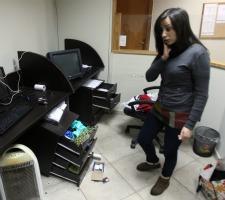BROOKE GLADSTONE: Muamar Orabi is the general director of the station Al-Wattan. He was in the States to talk to donors and rights groups. This was before we learned that his station was being sued for a million dollars for their investigation into corruption at a university, and the involvement of the son of a Palestinian official. He described to me the philosophy of Al-Wattan.
MUAMAR ORABI: Wattan TV was the first independent TV station operated in Palestinian territories, Wattan, in Arabic, meaning homeland. It’s not affiliates for any political party. There is the governmental TV and the other TV stations, it is the mouth of Hamas from Gaza. So the Palestinian people, they need Wattan TV as a free platform, and Wattan TV the most-watched local TV station in Palestinian territories.
BROOKE GLADSTONE: If I were to turn on Wattan television, what would I have seen?
MUAMAR ORABI: We focus mainly in the local news, the local taste. Unfortunately, in the mainstream media, they just focus about the political issue, which is important from my point of view but I think there is another life in Palestine. There is a story; the Palestinian people achieved a lot of success stories. There is a lot of cultural events, cultural life, social life.
BROOKE GLADSTONE: Your station was known for investigative journalism. What kinds of investigations?
MUAMAR ORABI: Mainly we focus about the taboo issues that the governmental media and official media avoid, like corruption in the Palestinian Authority, social issues such as the honor killing for the womens.
BROOKE GLADSTONE: Honor killings.
MUAMAR ORABI: Honor killings, about the discrimination, about the health care system.
BROOKE GLADSTONE: Describe then how Al-Wattan fits into the Palestinian media landscape.
MUAMAR ORABI: In Palestine and in Arab world, we are suffering many, many years from the governmental media. They focus about the false-positive issues. It’s a propaganda for the governments everywhere. There is another type of media; it’s a private media, totally run by business people. Sometimes it’s much worse because even the business people, they have agenda they want to promote. But Wattan, it’s a unique model in Palestine. It’s not owned by anybody.
BROOKE GLADSTONE: How is it supported?
MUAMAR ORABI: There is no personal shareholders. Wattan covered its operational cost from different sources – advertisement and commercial revenue. Fifty percent of our overhead came from donations, American and European. In 2007, two big American organizations, the State Department and USAID, invested a lot in Wattan, and most of the important equipment that confiscated is donated to Wattan by American people. This is not my own equipment only. This is the money – this is the equipment and the money of American taxpayer.
BROOKE GLADSTONE: What happened on February 29th? You were there.
MUAMAR ORABI: In February 29th, the Israeli Army came to Wattan at the middle of the night. They confiscated all of my equipments. We haven’t any computer to write our news. All of our financial records, confiscated. They confiscated our archive, our footage. According to Oslo Agreement, Ramallah under total control of Palestine Authority, which means even when they came to Ramallah and enter Ramallah, this is illegal!
BROOKE GLADSTONE: Now, the Israelis say that it had repeatedly warned your station that you were using frequencies that violated Israeli-Palestinian agreements, and that interfered with transmissions in Israel.
MUAMAR ORABI: Oh, the Israeli, they discovered our frequency illegal after 17 years? We are broadcasting since 1996, and according to Oslo Agreement, we need the approval of the Israeli and the Palestinian. There is a Technical Committee to approve the signals. And when we got the approval of Palestinian Authority, that’s mean we got the approval of Israelis.
BROOKE GLADSTONE: Harassing Palestinian journalists is not an exclusively Israeli occupation. Human Rights Watch called on the Palestinian Authority and Hamas to stop harassing Palestinian journalists, as well. Has your station had any problems with Palestinian authorities?
MUAMAR ORABI: Of course. It’s not secret. Wattan TV closed five times by Palestinian Authority. We are suffering from daily pressure from Palestinian Authority. We are suffering from Hamas government in Gaza. In Gaza now, it’s impossible to cover or to produce any stories. Sometimes our journalists in Gaza, they sent our footage through FTB, and we couldn’t mention their names because we’re afraid to arrest them in Gaza.
BROOKE GLADSTONE: What’s your background?
MUAMAR ORABI: I studied medical science and crisis management, and when Wattan destroyed in 2002, the board director approached me to find solution, how we can manage with the crisis that Wattan facing that time, totally destroyed, totally collapsed. That time [CRYING] I went to the TV just for three months, and then I take my decision to stay. [BREAKING UP]
And we started from nothing, From zero. That time, we haven’t any camera in the TV. I have a small camera and small computer, I bring it. We used this camera for news gathering. I stay months in, in my office working in the morning and sleeping in the couch, to find solution how we can save Wattan, because there is a lot of independent Palestinians, they love their life. They love Palestine. So we think that our voice not heard for our community and over the world. Most of us, we are working 16 and 17 hours daily [BREAKING UP] because we believe about Wattan voice. It’s our dream, and it’s very painful to see that they want to kill our dreams.
BROOKE GLADSTONE: Thank you very much.
MUAMAR ORABI: Thank you.
BROOKE GLADSTONE: Muamar Orabi is general director of Al-Wattan TV.

